Overnight care for the elderly
It’s not uncommon for older people to wake up more in the night than younger people. This can be due to a number of factors and is sometimes related to a condition such as dementia. Generally, however, it’s just down to a change in their circadian rhythm or ‘body clock’.
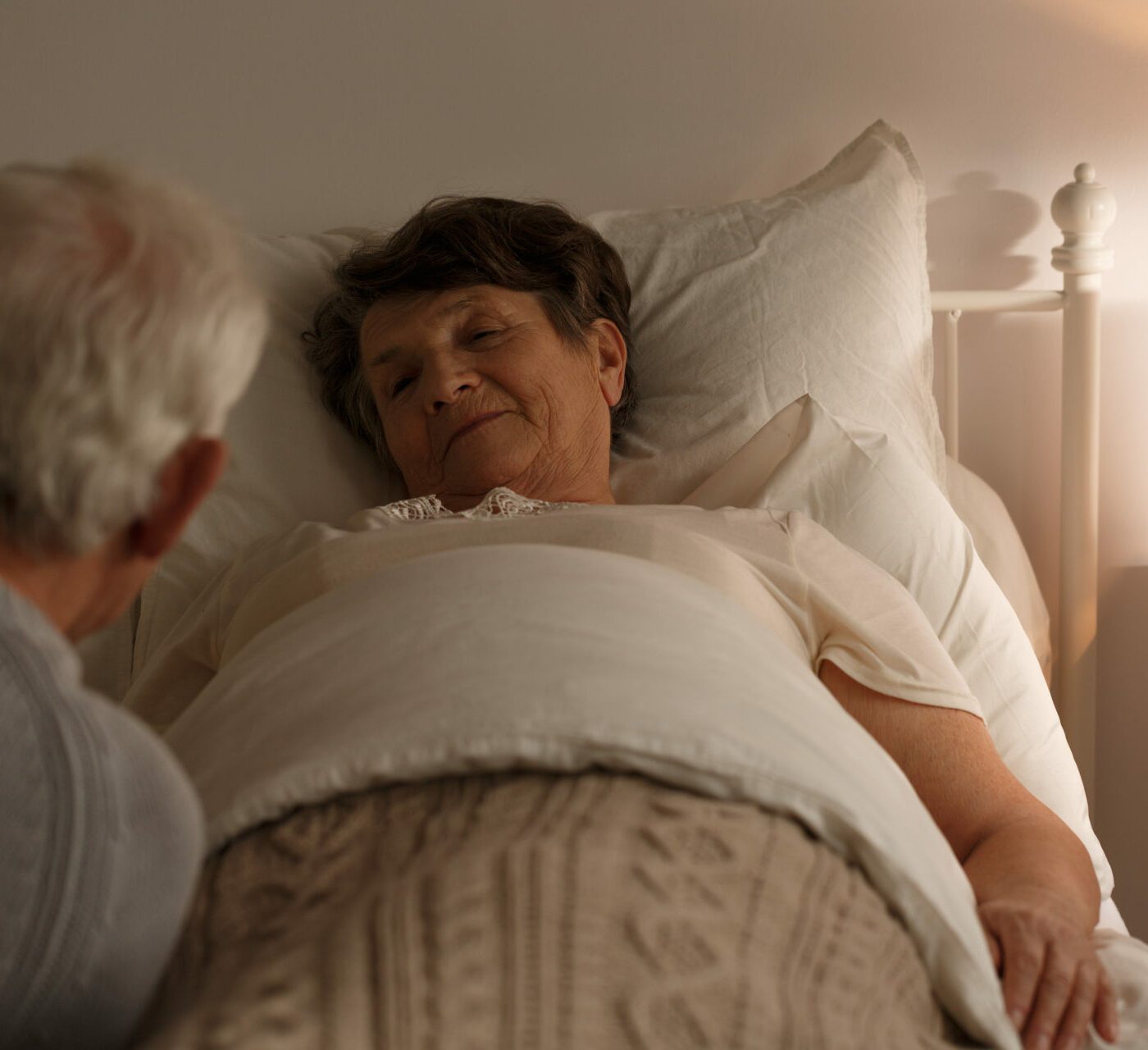
Quick overview
As we age, we are more likely to wake up at different intervals throughout the night due to natural changes to the body’s circadian rhythm (the body clock).
Choosing overnight care can provide reassurance that you or your loved one is safe and secure at all hours.
There are different options for overnight care, including full-time live-in care.
Being awake at night can lead to other concerns in the elderly, especially if they’re living with a condition such as dementia where waking in the night can cause confusion. This may cause them to wandering, or lead to further sleep disruption in the following days and nights.
Overnight care can help to ensure you or your loved one is cared for through the night – helping to ensure safety, while encouraging healthy sleeping patterns.
What is overnight care?
Overnight care is not to be confused with what we consider to be a ‘normal’ night’s rest. During the night hours, older people can often experience difficulty in resting. Broken sleep patterns aggravate degenerative conditions such as dementia and have a detrimental impact on the general well-being of those living with them.
These overnight disruptions can undermine a loved one’s confidence and sense of independence in living at home. They can feel anxious and disoriented as a result.
For those living with conditions such as dementia and Alzheimer’s these concerns are quite common. Sundowning is a term that refers to how those living with these conditions, mostly elderly in age, can end up disoriented and confused from around late afternoon through the evening and night. It’s sometimes worsened by the change of clocks in the spring and autumn.
Overnight care provides solid support throughout the night hours, helping your loved one to feel reassured and secure.
There are various professional care options such as sleeping care, waking care, sitting services and 24-hour care.
How to care for an elderly relative overnight
if you’re worried about a loved one’s sleep or safety at night the Sleep Foundation recommends the following:
- Ensure they’re having enough fresh air and exercise during the day
- Keep a regular sleep schedule – this means going to bed and waking at the same time each day
- Reduce bedroom distractions before bed such as television and bright lights
- Avoid alcohol, caffeine, and large meals late in the day as these may make it harder to sleep
- Keep a landline phone or personal alarm by the bed so they can call for help if they need to.
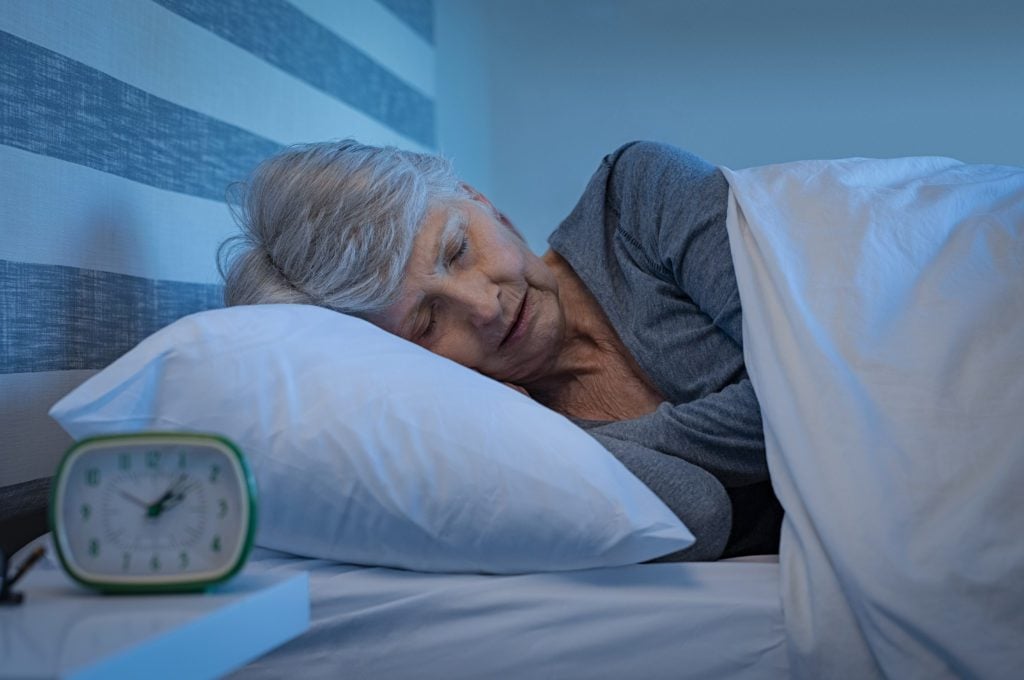
Are you caring for a loved one at night?
Getting up a lot during the night to help a loved one can be difficult on you too – especially if you have other responsibilities like work or children to take care of in the daytime. We spoke to Channel 4 sleep expert Stephanie Romiszewski about the science of sleep, and actionable steps caregivers and older people can take to get more of it.
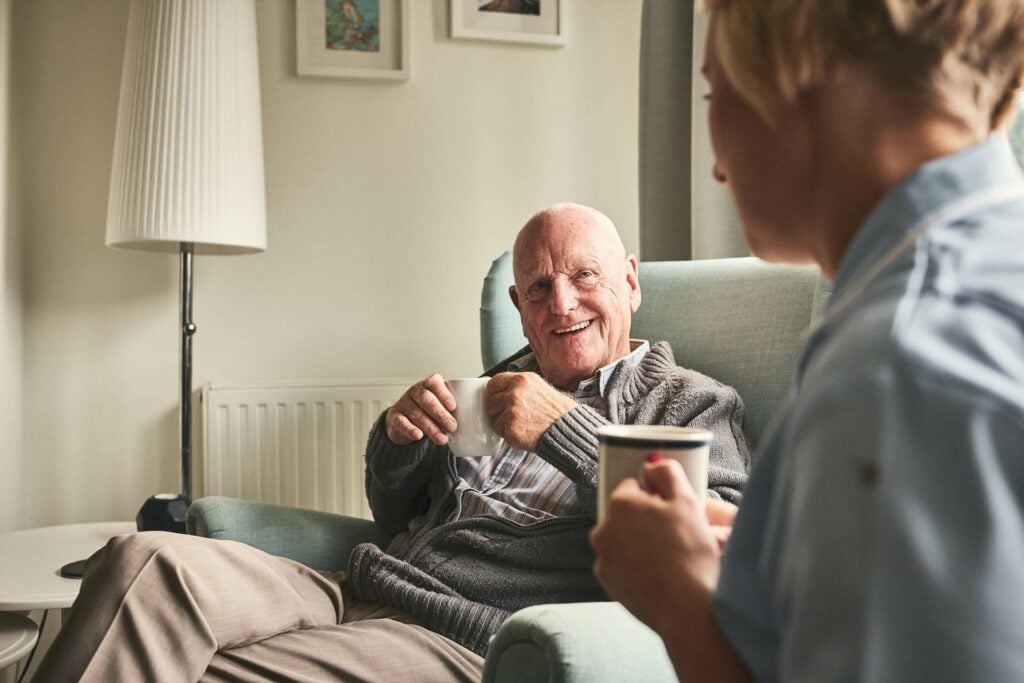
Everyone’s sleep patterns are different. However, it’s safe to say that most of us enjoy an uninterrupted period of sleep on a typical night. It’s important that you do not model your expectations of the type of care required overnight on your own sleep patterns, if you’re not the one in need of care.
As we noted, getting older means our sleep patterns change, sometimes dramatically, particularly if there are other medical conditions such as dementia and incontinence to contend with.
Monitor your or your loved one’s sleep habits to observe overnight acitivity. Waking once or twice is normal, but any more than this could suggest a night carer is needed.
You don’t want to be missing out on support that’s truly needed. But, at the same time, you won’t want to pay for an overnight carer if it’s not something that’s required regularly so really understanding the level of need is key.
Ways to monitor sleep
Home cameras
One of the suggestions for monitoring sleep is to install a home camera – with the right permissions of course. This would allow you to see and hear exactly what happens overnight and understand your or your loved ones sleeping pattern.
Sleeping apps
There are different sleep monitoring apps that can be used to track sleep cycles. If you or your loved one is happy and capable of using one, they can be a good way to track the full sleep cycle.
Talking
It’s important to talk about sleep and sleeping patterns with loved ones. There may be actions you can take together to help improve sleep, such as preventing noise from travelling from other rooms in the house, or creating a more relaxing evening environment.
Smart-watch or fitness trackers
If you or your loved one is happy to wear a fitness or smart-watch, these can be ideal for monitoring sleeping patterns while also tracking things such as heart rate. With technology like this, you can begin to better understand sleeping habits and what may be influencing them.
Reducing the risk of nighttime injury
Darkness is an obvious hazard overnight and increases the risk of someone falling and injuring themselves. Consider placing motion sensor lights in the bedroom and passageway, so that if someone gets up to go to the bathroom or get a drink of water in the night they can do so safely. Make sure the path from their bed to the bathroom and kitchen is clutter-free, and there are no loose rugs that they could trip over.
Keeping a bedside light in easy reach too may help. Try to choose a lamp which can easily be switched on in the dark. For example a touch lamp or inline cord switch will likely be easier to find and turn on than a traditional bayonet switch – which is usually located near the bulb and can be quite stiff.
If you’re supporting a loved one with a condition such as Alzheimer’s or another form of dementia may wake feeling disoriented and confused. Sometimes this gives way to restlessness, and they may feel the urge to go outside. Make sure the house is securely locked, with no easy, obvious, access to keys, as a nighttime deterrent to possible wandering. The Alzheimer’s Association also suggests covering door handles with cloth of a similar colour to the door, camouflaging the front door with a curtain, or use a pressure sensitive mat by the bed to alert you to movement.
Make sure you establish the root cause of their overnight wandering to see if there’s a simple way to mitigate the risk of it happening. For example, rather than the person having to make a trip to the kitchen for a glass of water, put a drink and an easy-to-eat snack beside their bed instead.
Managing incontinence
Incontinence – or lack of bladder control – is a common problem experienced by older people. While you can’t control this condition, you can take a few additional steps to encourage better comfort. This can include adult incontinence underwear or wearable washable pads for on top of the mattress. These pads stay dry to the touch and can help contain any accidents for a more pleasant night’s sleep.
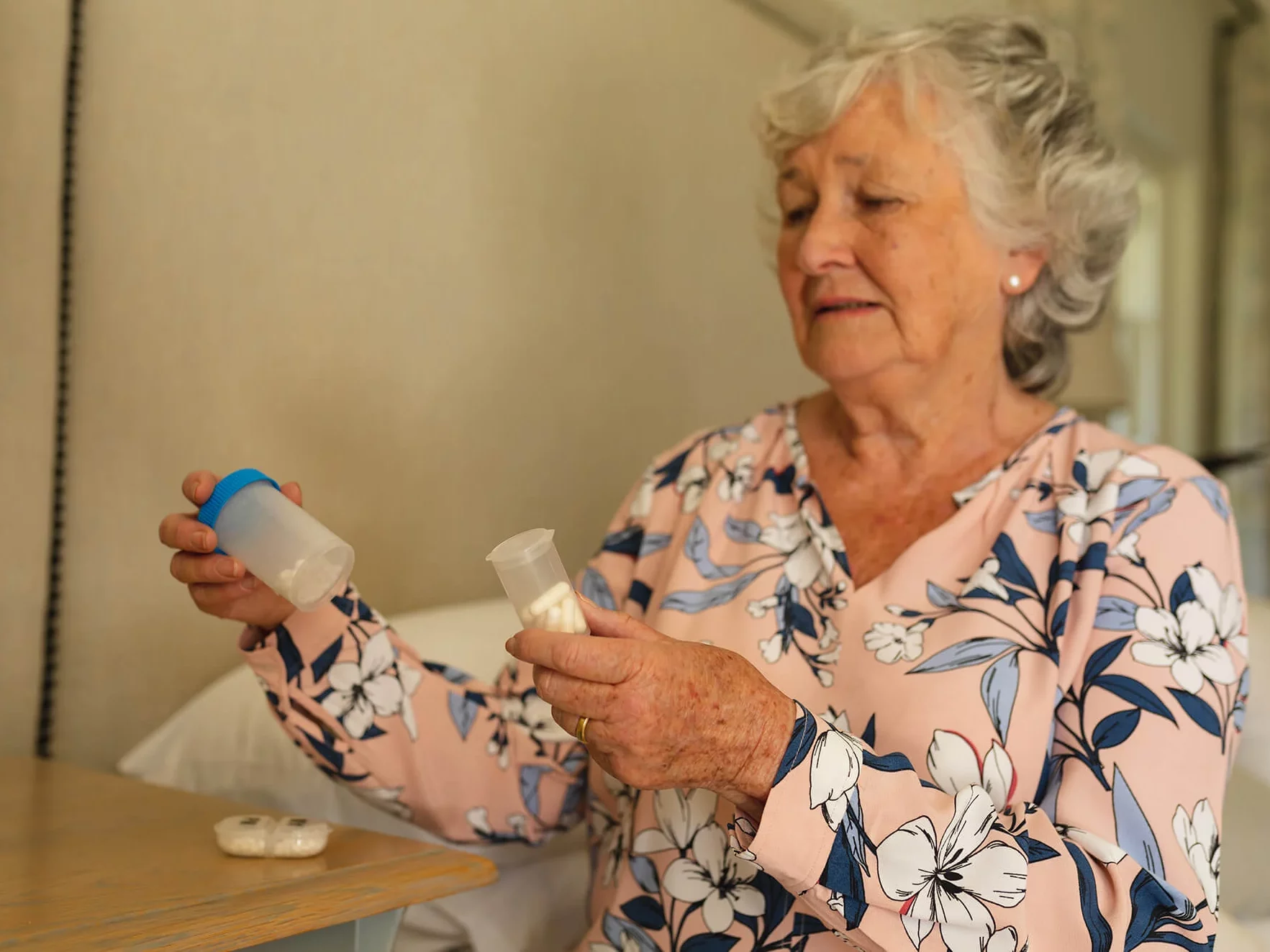
Types of professional overnight care
Opting for a professional carer to remain with you or a loved one overnight is a practical solution for uncertainty and anxiety of nighttime issues, whether medical, physical or psychological.
Sleeping night care
In this arrangement, a caregiver will sleep in the home of the person they’re caring for. This can be helpful for people who are anxious if they’re left alone during the night, but don’t need a great deal of physical support.
The carer will be there for at least eight hours and will sleep in their own room but will be available to help your loved one if they need assistance during the night. Think of it as the carer being ‘on call’ if they’re needed. Normally, a carer working a “sleeping night” would not expect to have to get up any more than twice. If someone needs more frequent attention than this, the shift would be classed as a “waking night”.
Waking night care
In this home-care option, the carer is actually on duty in your loved one’s home for a shift of around 10 hours, although different shift lengths may be arranged. They will not need a room or a bed, as they’ll not be sleeping.
If your loved one needs help several times during the night, this could be the best option for them. For example, they may require assistance in changing their position at regular intervals to prevent the development of pressure sores, or they might need medication administered at set times.
For older people needing dementia care, waking care might be necessary to ensure that they do not come to any harm during the night. People living with dementia are sometimes unable to interpret the signs that it’s night time and may get up and try to leave the house. In-home night care for them would need to be from a carer who was alert to this possibility.
An elderly person who is very anxious and needs reassurance from a carer may also need waking night care.
A sitting service
This might be needed if you or another family member provides elderly care for your loved one during the day, but need a break during the night. A carer would visit to stay with the older person for a fixed length of time, such as two or four hours, while the primary carer has a break.
How Elder can help with overnight care
There are three main options for overnight care from a care professional.
The first is where the carer sleeps at the home of the person they’re caring for and gets up a maximum of two times in a night. This option provides an extra layer of security and peace of mind for both you and your loved ones. This is included in Elder’s standard live-in care package.
The second is that overnight care is the primary function of the live-in carer – they’re not available during the day as a 24-hour carer would be.
The third night-care option is where two carers perform live-in care duties throughout the day. They would remain on site overnight and be on duty throughout. This option is ideal if a person is awake multiple times overnight either due to pain, disorientation or to take medication.
More choice
Choose your carer from our 5000+ community, and manage care easily with your MyElder account.
More control
Whether you need care in 24 hours, or are planning ahead, we can help you take control.
More support
Our support specialists and clinical team are here to listen, guide, and empower 7 days a week.
More value
No surcharges, no hidden costs, and no joining fees– just truly personalised care.
Cost of overnight care at home
When looking at overnight home care options, it’s vital to consider the costs involved. It’s important to note that the precise rates of care vary significantly according to the your needs, and exactly when you need care.
Paying for a carer overnight can cost around £17-30+ per hour, depending on the needs of the care recipient. Be sure to factor in exactly how much care will be needed – will it be a couple of checks during the night, or someone consistently monitoring and offering support?
If you’re looking for additional help with bedtime routine and morning routine, dressing and undressing, washing brushing teeth, taking medication and so forth, you may need around 10-12 hours of care per night.
Paying for a home carer on an overnight only basis could cost around £1000 per week, in addition to any day time visits that may be required. For this type of domiciliary overnight care, weekends and bank holidays may be charged at a premium depending on your provider.
Realistically, you’re often going to be paying a lot more by directly employing carers. It’s not just about ensuring you’re paying the right salary to your home carer. By taking on the role of direct employment, you’re also liable to cover sick pay, holiday pay and parental cover.
If you opt to hire a home carer through Elder, you’re able to avoid this liability, but you still get the complete peace of mind that you’re getting the dedicated, one-on-one care you deserve in your own home. We work hard to match you with an independent caregiver who shares interests and hobbies. And, we don’t charge extra over bank holidays or weekends.
Help with costs
There are a range of government funding options and benefits available, which can assist with care, including overnight care costs. Local authority funding is dependent on assets, and this varies from England to Wales and Scotland. This funding depends on the needs of the individual, so you would have to complete a care needs assessment to determine eligibility and the amount.
If local authority funding is the most suitable option for you, you’re able to take this in the form of a direct payment. This gives you complete control over the money – meaning you’re able to choose the care option, and even the provider you think is best.
A Care Needs Assessment can also determine if your loved one is entitled to NHS Continuing Healthcare. This financing is for care and support taking place outside the hospital. If eligible, your loved one would receive the full costs of their care and a bespoke care and support package would be provided by a healthcare professional.
Unfortunately, despite growing pressure from a host of charities – including the Alzheimer’s Society – dementia does not automatically make you eligible for NHS Continuing Healthcare.
There are benefits for both people in need of care and their family caregivers too. The Personal Independence Plan (PIP), via the Department for Work and Health is not means tested – it’s based on a medical assessment and covers long term health conditions for those below the age of 65.
Attendance Allowance is specifically for those who need help with everyday tasks, getting around and medical care. As with PIP, it’s not means tested but has two components – day and night and day only – so the amount required depends on the exact care required.
If you look after someone for 35 hours a week or more, you may be entitled to a Carer’s Allowance – the amount depends on your financial situation and on meeting eligibility criteria.
Read more on care
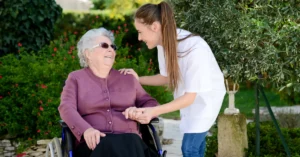
What is at-home post-operative care?
Post-operative care, also named convalescent care, is a crucial aspect of recovery following a surgical procedure. This specialised care is tailored to meet the unique
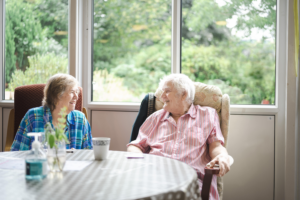
What happens if a loved one refuses to move into a care home?
Looking after an elderly loved one with specialist care needs can be a difficult time for any family, and one of the biggest problems you

Care homes vs nursing homes – what’s the best option?
Care Homes Vs Nursing Homes – What’s the Best Option? At some point, your loved one may reach a stage where they require 24-hour care.